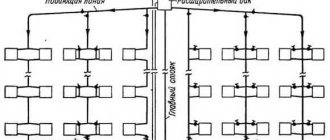Connecting heat supply in an apartment building
Before organizing heat supply to non-residential premises, it is necessary to carry out a primary analysis of the characteristics of the building.
To complete this step correctly you need:
- Select the thermal operating mode based on the purpose of the room.
- Calculate heat supply using dimensional indicators as a basis.
- Decide which coolant will be used.
Based on the information obtained as a result of the mentioned procedures, the method by which the room will be heated is selected.
Then everything is done like this:
- Activities are carried out as a result of which it becomes possible to supply coolant to non-residential areas, that is, the necessary communications are supplied.
- Do not forget that heating does not appear by itself. For everything to work, you need to conclude an agreement with heat suppliers for its supply.
Important. It is worth noting that any project of an administrative or industrial building should begin with an analysis of possible types of heating.
When assessing a room, special attention should be paid to its heat losses. If calculations show that they are too large, then you can resort to additional thermal insulation by installing it on the heated area. In this way, you can achieve a tangible effect.
What legislation and regulations regulate heat payments?
Since it is possible to provide heating in non-residential premises, someone must pay for the heat. This fact is clearly stated in Decree of the Government of the Russian Federation No. 354.
also clearly defines the formulas used to calculate the amounts paid for heating non-residential premises.
The aforementioned legislative act also stipulates that the calculation of the heating payment amount using the indicated formula can be carried out if we are talking about non-residential space in an apartment building that has a collective, that is, a common house-wide meter for incoming thermal energy.
However, in such a situation, in a particular building, not all areas, both residential and non-residential, can be equipped with individual meters. Moreover, the resolution in question contains not only information regarding payment for heating of non-residential premises.
It also includes formulas by which, under certain conditions, calculations can be made to pay for heating residential areas. also described contains information regarding the calculation of payment for other housing and communal services such as hot and cold water supply, electricity, etc.
The meaning of the amendments to the RF PP dated December 26, 2016 No. 1498
Now let’s explain in general the essence of the amendments introduced by the Russian Federation GD dated December 26, 2016 No. 1498 to Rule 354 regarding the procedure for the supply of utility resources to non-residential premises of apartment buildings.
Paragraph 2 of paragraph 7 of Rules 354 as amended, valid until 01/01/2017, established:
“An agreement containing provisions for the provision of utility services, concluded in writing, must comply with the provisions of these Rules and may contain specifics for the execution of such an agreement in the cases and within the limits provided for by these Rules. If a written agreement containing provisions on the provision of utility services does not comply with the provisions of these Rules, it is considered concluded under the conditions provided for by these Rules.”
As amended by the Russian Federation GD dated December 26, 2016 No. 1498, the above provision has been slightly changed, its meaning remains almost the same, but it is necessary to pay attention to an essential detail. From 01/01/2017 paragraph 2 of clause 7 of Rules 354 in the new edition establishes:
“An agreement containing provisions for the provision of utility services in residential premises in an apartment building or residential building (household) , concluded in writing, must comply with the provisions of these Rules. If the said agreement does not comply with the provisions of these Rules, the agreement is considered concluded on the terms and conditions provided for by these Rules.”
At the same time, changes were made to paragraph 3 of paragraph 7 of Rules 354, which in the new edition became paragraph 4, namely: the sentence “The consumer cannot be denied the provision of utility services if the consumer does not have a written agreement containing provisions for the provision of utility services " was replaced by the sentence "A consumer in a residential premises cannot be denied the provision of utility services if the consumer does not have a written agreement containing provisions for the provision of utility services."
Why did the Government of the Russian Federation need clarification about residential premises ?
The answer is simple - new amendments introduced by the RF PP dated December 26, 2016 No. 1498 establish that utilities are consumed exclusively in residential premises of apartment buildings. And if the person managing the apartment building (UO/HOA) is the provider of utility services, then it provides such services exclusively to consumers in residential premises.
What is the situation with non-residential premises?
A paragraph (paragraph 3) has been added to the same paragraph 7 of Rule 354, establishing:
“The supply of cold water, hot water, electrical energy, thermal energy and gas to non-residential premises in an apartment building , as well as the disposal of waste water, is carried out on the basis of a resource supply agreement concluded in writing with the resource supply organization , which must comply with the provisions of the legislation of the Russian Federation on water supply , water disposal, electricity supply, heat supply, gas supply. Determination of the volume of thermal energy consumed in non-residential premises and the method of payment by consumers for heating utility services is carried out in accordance with these Rules. If the said agreement does not comply with the provisions of the legislation of the Russian Federation on water supply, sanitation, electricity supply, heat supply, gas supply, the agreement is considered concluded on the terms provided for by the legislation of the Russian Federation on water supply, sanitation, electricity supply, heat supply, gas supply and these Rules.”
Please note that utility services are not provided in non-residential premises! Types of public services are defined by paragraph 4 of Rule 354, their exhaustive list includes seven types, “hot water supply”, “sewage disposal”, “electricity supply”, “gas supply”, “heating”, “solid municipal waste management”.
In paragraph 3 of paragraph 7 of Rule 354, completely different terms are used: not “cold water supply”, but “cold water”; not “electricity supply”, but “electric energy”, etc.
Where does this discrepancy in terminology come from?
Let us turn to paragraph 2 of Rule 354, paragraph 10 of which defines:
" "municipal resources" - cold water, hot water, electrical energy, gas, thermal energy, coolant in the form of hot water in open heating systems (hot water supply), domestic gas in cylinders, solid fuel in the presence of stove heating, used to provide utilities services and consumed in the maintenance of common property in an apartment building. Wastewater discharged through centralized utility networks is also considered a municipal resource.”
It is the terms used in the above provision that are used in paragraph 3 of clause 7 of Rules 354, and this only means that communal resources are supplied to non-residential premises.
That is, utilities are not provided in non-residential premises; it is communal resources that are supplied to non-residential premises!
Therefore, it does not matter who is the provider of utility services (from 01/01/2017, utility services can only be provided in residential premises of apartment buildings), utility services are not provided in principle in non-residential premises.
And Rules 354 as amended by RF PP dated December 26, 2016 No. 1498, imperatively establish that the non-residential premises of an apartment building are exclusively supplied with utility resources, such supply is carried out on the basis of resource supply agreements and exclusively by resource supply organizations .
Then why do the courts study whether changes have been made to the management contracts, and whether the management company is the executor of public services? Probably, the desire to study such an issue when considering a dispute about the supply of communal resources to non-residential premises arises in the courts due to the insufficient competence of the judges forming the panels of such courts, their lack of understanding of the essence of the amendments introduced by the RF GD dated December 26, 2016 No. 1498, and the scheme of interaction of the RSO with owners of non-residential premises, mandatory established from 01/01/2017.
Paragraph 3 of paragraph 6 of Rules 354, introduced by the RF PP dated December 26, 2016 No. 1498, establishes:
“The supply of cold water, hot water, thermal energy, electrical energy and gas to non-residential premises in an apartment building , as well as the disposal of waste water, is carried out on the basis of resource supply agreements concluded in writing directly with the resource supplying organization .”
The above rule also imperatively establishes that it is utility resources that are supplied to non-residential premises, the supplier of such resources is the RSO, and it is resource supply contracts that regulate such relations (management contracts, in principle, cannot include provisions on the supply of utility resources, and utilities from 01/01/2017 are provided exclusively in residential premises of apartment buildings).
Moreover, the Government of the Russian Federation has also provided for the case of the absence of a resource supply agreement. The courts also pay attention to this issue and conclude that if an agreement between the owner of the non-residential premises and the RSO is not concluded, then the provisions of the management agreement concluded between the management company and the owner of the non-residential premises of the MKD continue to apply in terms of the provision of utilities.
It is strange that the courts do not see rules directly regulating the situation of the absence of an agreement, but invent some non-existent rules that directly contradict the provisions approved by the Government of the Russian Federation (thus the courts, of course, exceed their powers).
Paragraph 5 of clause 6 of Rules 354, introduced by the RF PP dated December 26, 2016 No. 1498, establishes:
“ If the consumer in a non-residential premises does not have a written resource supply agreement providing for the supply of communal resources to a non-residential premises in an apartment building, concluded with a resource supplying organization, the volume of communal resources consumed in such non-residential premises is determined by the resource supplying organization using calculation methods provided for by the legislation of the Russian Federation on water supply and sanitation, electricity supply, heat supply, gas supply for cases of non-contractual consumption (unauthorized use).”
That is, in the absence of a resource supply agreement between the owner of the non-residential premises and the RSO, it is necessary not to apply the management agreement, looking for provisions in it on the provision of utilities, which (utilities) in accordance with the new scheme in non-residential premises are not provided, but to apply directly regulating such case the norm, namely: to recognize the fact of non-contractual consumption and recognize the right of the exclusive RSO to present a utility resource for payment to the owner of non-residential premises in the amount calculated for the case of non-contractual consumption.
Of course, in this case, the MA cannot have any relation to the interaction of the RSO with the owner of the non-residential premises, and cannot be recognized as the provider of utility services in relation to the non-residential premises in the apartment building.
Understanding the logic of the amendments introduced by the Russian Federation GD dated December 26, 2016 No. 1498, it becomes quite easy to understand the mistakes of the courts in applying norms that are not subject to application.
For example, the courts, establishing the obligation of a management organization to interact with the owners of non-residential premises (and the absence of such an obligation for the RSO), refer to the following rules:
1) Clause 13 of Rules 354, which defines: “The provision of public services is provided by a management organization, partnership or cooperative ... through the conclusion of agreements with resource supplying organizations on the acquisition of public resources for the purpose of using such resources in the provision of public services to consumers.”
This norm, in the opinion of some courts, established that it is the management company/homeowners association/housing cooperative that is obliged to provide utility services to the owners of non-residential premises.
Taking into account the previously presented analysis and the fact that in non-residential premises of apartment buildings, utilities have not been provided in principle since 01/01/2017, it becomes clear that paragraph 13 of Rules 354 not only does not establish the obligation of the management company/housing association/housing cooperative to provide utilities in non-residential premises of apartment buildings , but in general does not regulate the interaction of management units/homeowners' associations/housing cooperatives with non-residential premises.
2) Part 6.2 of Article 155 of the Housing Code of the Russian Federation: “ A management organization, a homeowners’ association or a housing cooperative or other specialized consumer cooperative that receives payment for utility services carries out settlements for the resources necessary for the provision of utility services with the persons with whom such managers an organization, a homeowners' association or a housing cooperative or other specialized consumer cooperative has concluded agreements for cold and hot water supply, sewerage, electricity supply, gas supply (including the supply of domestic gas in cylinders), heating (heat supply, including the supply of solid fuel in the presence of stove heating ), in accordance with the requirements established by the Government of the Russian Federation."
Of course, management companies/homeowners associations that provide utility services to consumers and receive payment from consumers for these services are required to pay for the corresponding utility resource purchased from the RSO for the purpose of providing utility services.
But the management company/homeowners association does not provide utilities in non-residential premises, and the utility resources consumed in these non-residential premises are supplied directly by the RSO.
3) Part 1 of Article 161 of the Housing Code of the Russian Federation: “ Management of an apartment building must ensure favorable and safe living conditions for citizens, proper maintenance of common property in an apartment building, resolving issues regarding the use of said property, as well as the provision of utilities to citizens living in such a building or in in cases provided for in Article 157.2 of this Code, the constant readiness of utilities and other equipment that are part of the common property of the owners of premises in an apartment building to provide utility services.”
The above rule actually establishes that “managing apartment buildings” includes the provision of public services. Consequently, the management authority that specifically manages the apartment building is, as a general rule, obliged to provide utility services. But such services, in accordance with the above norm, are provided to “ citizens living in such a house .” Citizens are known to live in residential premises . There is no mention of non-residential premises in the above standard!
Calculation formula
As mentioned above, the formula by which the heating of a non-residential space, such as a basement, is calculated, is clearly stated in Decree of the Government of the Russian Federation No. 354.
The formula looks like this: P = S x V x T. Where:
- S is the total area of a certain room located in an apartment building.
- V is the volume of thermal energy consumed on an average monthly basis and calculated over the past year. It is calculated as the ratio of the readings of a common building meter to the number of calendar months in a year and the total area of both residential and non-residential areas located in the apartment building.
- T is the tariff for incoming heat, clearly indicated as required by the laws of the Russian Federation.
It is worth noting that the result obtained using the above formula may be adjusted when the first quarter of next year arrives. Thus, the calculation of heating in non-residential premises is clearly regulated by the legislation of the Russian Federation .
All possible adjustments are clearly stated in the above-mentioned resolution. Thanks to him, any deviation from the formulas established by law is an illegal act. If a citizen accidentally or deliberately made such a mistake, then he can be held accountable in accordance with the law.
How does it work in practice?
As mentioned above, such a calculation is made according to the formula: P = S x V x T. This means that if the area of the room is 34 square meters, the amount of thermal energy consumed on average is 0.085 Gcal, and the tariff for heating supplied to the room is 1371, then 34 x 0.085 x 1371 = 3962.1 rub.
Do not forget that if a heat meter is installed in the building, then the management company must make all calculations in the shown way and not otherwise.
In such a situation, the payment calculation procedure should consist of several steps. First, you should coordinate the total area of the real estate with the size of the specific non-residential premises.
Then everything is done like this:
- The readings of the common house meter are reconciled at the beginning and end of the paid period of time.
- The resulting difference should be considered the total energy consumption of the MKD.
- Next, the ratio of the area of the room and the size of the entire structure is calculated.
- The value of the heat tariff is determined. Such information can be obtained from an authorized employee of the management company.
Attention. If you do not follow the steps described and do not obtain the information mentioned, then it will be impossible to calculate using the indicated formula.
Additional calculation formulas
Meters for calculating heat energy in an apartment building are installed upstream of the building. The device shows how much heat is supplied to the apartments of the entire building. Heat is calculated proportionally for all apartments. The calculation is carried out as follows:
P = (Rebt + (Plzh x (Ot - ∑Rebt)) / Plob) x Tt
Plzh is the area of the apartment. Floor area - the total area of residential and non-residential premises in a building. From - the volume of heat energy according to the ODPU readings when paid during the heating period or according to the average heat energy indicator by month for the previous year. Tt is the tariff set for heat energy. Total - the volume of heat that is needed to heat the entire living space. ∑Tot is the volume of all heat energy consumed in residential and non-residential premises of a high-rise building.
To calculate the Obt indicator, you also need a formula:
Obt = Plz x (From / (Plob - Plind + Ploi))
Ploi - the area of those premises that are for common use. Plind is the area of residential and non-residential rooms in which there are no heating devices or their own heaters are installed.
The calculation is carried out according to the following formula:
∑Obt: From/ (Plob + Ploi) x Plob
If in one residential building an individual metering device (IMU) is installed in at least one of the apartments, it is included in the calculation of the total payment for heating. To calculate payments in houses where IPU is installed in several apartments, the same formula is used as for houses with ODPU, but without IPU.
For those premises in which there is no IPU, the Obt indicator is calculated as follows:
Obt = Plzh x (∑ObtIPU / ∑PlzhIPU)
∑ObtIPU - the total amount according to the indications of the IPU, if the calculation and accrual of payment occurs during the heating season. Or by the average monthly heat volume for the previous year. ∑PlzhIPU - area of all rooms with IPU.
It’s not easy to count the first time, but even the second time, it becomes clear what indicator and what meter readings should be inserted where
How does the heat turn off?
According to current legislation, neither the owner of the premises nor the HOA can stop heating non-residential premises in an apartment building. The heat will not be turned off, even if the owner has a huge debt to pay for it. In this case, according to the law, the heat supplier must legally collect debts from the owner of the area , and not turn off the heating.
This phenomenon is due to the fact that stopping the heat supply can affect the operation of a room not intended for living. Thus, stopping the supply of coolants that provide a favorable temperature is very difficult to achieve, especially considering the fact that such an act is considered illegal and entails criminal liability.
If the owner of the premises voluntarily wants to turn off the heating of a non-residential premises in an apartment building, then nothing will work out for him either, since this contradicts the Decree of the Government of the Russian Federation No. 354.
Payment for heating, as well as its calculation, differs little from those established for residential areas , especially considering that the calculation formulas for them are prescribed in one legislative act.
However, there are still some differences, and it is best for owners of areas not intended for residential use to familiarize themselves with them in order to avoid possible problems and difficulties in the future.










